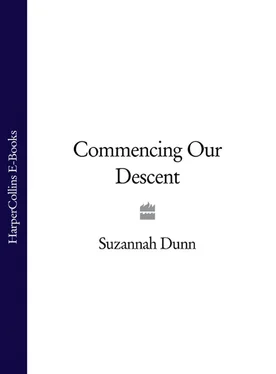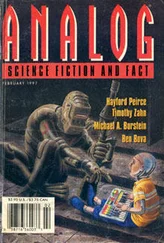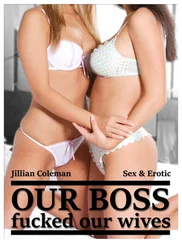‘You spoil that mutt.’
‘So? Isn’t life hard enough without a bit of spoiling? And he’s four. Didn’t people spoil you when you were four?’
‘I was a person.’
‘When you were four? You sure, Jason?’
Hal, with his impeccable manners, his love of home and liking for everything to be just so, seems human. He is more domesticated than I am.
Jason’s mobile phone screams from the tool box. During all the years that he has been coming here, he has carried this particular prop: a workhorse of a mobile phone, antiquated and bulky.
He tells me, ‘I’m not answering.’
‘Mobiles are for answering; that’s what they’re for.’
Despairing of me, he snatches the phone from the box, stops the noise, listens intently.
‘Yep. Okay. Six-ish. In a while, crocodile.’
He slots down the aerial, and I think of the shop on the way to the park: For all your satellite and aerial needs . Needs that I do not know that I have. Every day, I resist the urge to go in there and ask, All my satellite and aerial needs ?
Jason says, ‘My eldest: could I pick her up from rehearsal on my way home.’
I am awed by his daughters’ social schedules, by their mother’s fixing of old-fashioned girlhoods for them: stage school, horse-riding, hockey club and music lessons. The household seems to run like a finishing school, but the finish is a tough one: from what Jason says, the activities do not revolve around an aim to become accomplished, to learn, but a desire to be equipped: with competitiveness and a sense of fair play, improved posture and strengthened bones.
As a child, I had no place in any world apart from that of my mother’s. Unless I was in school, I went everywhere with her, which was nowhere: the park, the shops. The only advice that I remember from her was that there is nothing more important than a good marriage, but she never told me how to make one because she did not know. Odd to think of my parents now, in early retirement, relatively companionable, apparently having reached some kind of truce.
‘Just one more year of school for my eldest.’
‘And then?’
‘Wants to work in a shoe shop. Says she loves shoes.’ He frowns into the tool box. ‘Does that mean that I love power showers and central heating systems? Suppose I do, though.’ He looks up at me. ‘Do you think you’ll have kids, now?’
‘I have to find a job first: that’s the plan.’ Instantly, I realise how ridiculous this must sound to him. I try to explain, ‘I need a life, Jason.’
‘You have a life, don’t you?’ He is genuinely puzzled.
I used to be a carer: that is the currently favoured term. Caring is the buzz word for what I did, here, at home, for eight years. So perhaps, now that it is all over, I should turn professional. There is nothing professional, though, about the jobs in nursing homes that are advertised every week in our local newspaper. Unsociable hours and low pay. If I had such a job, I would see even less of Philip. Hard work for very little money, he says, and we have no real need of the money, so why work simply for the sake of working? He says that I should do something that I want to do. But this is exactly my problem: what do I want to do? What can I do? I have a sense that I should train for something, learn something, but training is extensive, expensive, and I have no experience of anything, so no one would want me for their oversubscribed courses. And even if I did train, would there be a job for me? My problem is that I have been away from the world for too long. I cannot imagine how other people cope with the power struggles, timetables, deadlines, and expectations, not least the expectation that they will leave the house every day, for most of the day. No, I do not want to do anything. But I know that I cannot stay as I am.
‘You’re looking for a job?’
I wrinkle my nose: ambivalent confirmation. This morning’s cursory look through the newspaper ended prematurely in a perusal of adverts, one of which was entitled, Impotence problems ?
Impotence problems ? Problems over and above the impotence?
There were other adverts: Hair loss?, Flabby belly ?, Panic attacks ?
And I thought that I had problems.
‘Coffee?’
‘Wonderful.’
As soon as I move, Hal whips from his prone position. He is due his lunch. What would he have done if I had forgotten? I love to watch him with his food. Fast but fastidious, he laps up the gravy before beginning on the biscuits. His tail, usually wagging, will droop: serious happiness.
I am a couple of stairs down when Jason calls, ‘You love piano music, don’t you. What’s playing, now, downstairs? Scott Joplin?’
‘No, but you’re close. It’s a …’ I flinch from using the word pastiche , ‘… fake, a modern fake.’
Will he ask why a fake, when we can have the real Scott Joplin? Could I explain that but for the work of this particular, later composer, William Bolcom, there would have been no Scott Joplin? No Scott Joplin as we know him. He would have been unknown; dead and unknown.
‘Would you rather hear something else?’ Philip says that my listening to piano music is pathological. He reels from Czerny, Nancarrow. ‘Because I can play you … oh, I don’t know’ … – what was I playing earlier? – ‘The Au Pairs?’
He laughs. ‘Seriously? The Au Pairs?’
‘An old tape.’
‘A very old tape, I imagine. No, this is nice. What’s it called?’
‘ Graceful Ghost .’
I am half-way down the stairs when I hear him say, ‘Your theme tune.’ He says it lightly, without irony or reservation.
Glancing upwards, I see that he is already busy again; absorbed.
I love the word grace , how it seems to elude definition. I would love to be graceful. Perhaps I would be, if not for the dead weight of my left foot.
Coming down into the hallway, I sense the house recovering from the presence of Annie, living poltergeist. She had said that she would pop over , but she never pops, she takes root. Arriving on Saturday afternoon, she stayed overnight and until mid-afternoon yesterday. A whole weekend. Just as she did on the weekend before last. The current problem is the break-up, a month or so ago, with her latest: someone called Pete, who, she told us, had been around for three or four months.
When she arrived, she laughed, ‘No one as beautiful and talented as I am should have to stay home alone on a Saturday night.’
While she was upstairs, unpacking, Philip said, ‘She’s harmless.’
He could have said, She’s your friend .
He says that we should have her to stay because she has a flat in London; we have a Victorian terraced house with a garden, close to the countryside, and she has a ‘sixties studio on an estate in a backwater of Edmonton. Perhaps, to Philip, this counts as a kind of homelessness; perhaps I misheard, perhaps he said homeless rather than harmless .
When she had unpacked she came downstairs cooing to Hal, ‘How’s my favourite, then?’
I said, ‘I’m fine, thanks.’
‘Oh, you ,’ she derided.
She likes Hal, and Hal likes her. But Hal likes anyone who likes him.
As she passed me, I detected the usual pot-pourri of cosmetics: perfume and deodorant, soap and shampoo, lotions and fabric conditioner. As ever, her breath was scented with garlic, alcohol and chocolate. Perhaps she breathes harder than other people. Perhaps she stands closer.
With the slightest turn of her head, her long, sleek brown hair becomes a blade. On the rare occasions during her visits when she moves from my settee, the cushions are more crushed than anyone else would leave them. In her pillow, in the mornings, there is a hollow of awesome proportions and duration: eerily suggestive, somehow, of a catastrophe. And for days after she has gone home, I come across crockery in unnerving places: a cup in a soap dish, this morning.
Читать дальше












